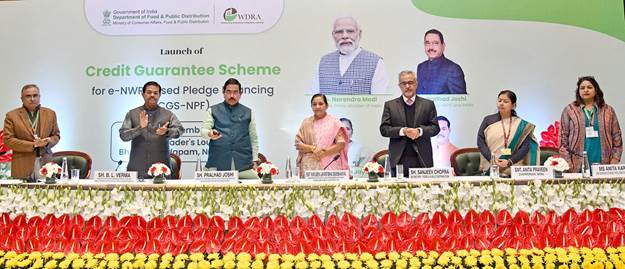New Delhi: The Union Minister of Consumer Affairs, Food and Public Distribution and New & Renewable Energy, Pralhad Joshi, today unveiled the Credit Guarantee Scheme for e-NWR based Pledge Financing (CGS-NPF) in the capital. With a corpus of ₹1,000 crore, the initiative is designed to provide farmers with critical post-harvest finance by leveraging electronic negotiable warehouse receipts (e-NWRs) issued against commodities stored in Warehousing Development and Regulatory Authority (WDRA)-accredited warehouses.
Launching the scheme, Joshi emphasized its role in addressing the pervasive issue of distress selling among farmers. He called it a game-changer in boosting farmer incomes and enhancing their access to affordable credit. The Minister highlighted the importance of registering more warehouses under WDRA accreditation, urging developers to prioritize construction closer to farmland. He stated that e-registration would be a key factor in the scheme’s success and in expanding its reach to the most vulnerable farmers.
The initiative offers farmers and traders a guarantee cover for loans availed against e-NWRs, instilling confidence in banks to extend pledge finance for agricultural and horticultural produce. Joshi noted that the scheme specifically targets small and marginal farmers, women, Scheduled Castes, Scheduled Tribes, and persons with disabilities, providing them with financial security at minimal guarantee fees. He expressed optimism that the initiative would catalyze a significant shift in agricultural credit practices, benefitting not only farmers but also small traders, MSMEs, and Farmer Producer Organizations (FPOs).
Drawing from his own experiences, Joshi encouraged banks to adopt a more lenient approach when dealing with farmers’ loan settlements. He reiterated Prime Minister Narendra Modi’s commitment to farmer welfare, pointing out that the government continues to provide fertilizers like urea at the lowest global prices despite international conflicts that have driven up costs.
Union Minister of State for Consumer Affairs, Food and Public Distribution, Nimuben Jayantibhai Bambhaniya, described the scheme as a cornerstone of the government’s efforts to protect farmers’ livelihoods and advance Prime Minister Modi’s vision for rural development. Her colleague, B.L. Verma, highlighted the scheme’s dual focus on addressing both credit risks and warehouseman risks, thereby building trust between farmers, banks, and other stakeholders in the supply chain.
Secretary of the Department of Food and Public Distribution, Sanjeev Chopra, projected the long-term benefits of the scheme, expressing hope that it would boost post-harvest lending to ₹5.5 lakh crore over the next decade. He emphasized the importance of complementary initiatives such as the recently launched e-Kisan Upaj Nidhi platform, which streamlines the lending process for farmers by integrating end-to-end digital solutions. Chopra also outlined the pressing need to expand warehouse registrations, targeting 40,000 certified facilities within the next two years, to further strengthen the agricultural supply chain.
The scheme is expected to improve the availability and accessibility of finances for small and marginal farmers while fostering greater participation from MSMEs and FPOs. Loans up to ₹75 lakh for small farmers will receive a guarantee cover of 80 to 85 percent, while loans up to ₹2 crore for MSMEs and traders will be covered up to 75 percent.
Joshi described the initiative as a significant step toward enhancing India’s agricultural infrastructure and empowering rural communities. He emphasized that the scheme’s focus on addressing post-harvest challenges and improving access to credit aligns with the government’s broader goals of doubling farmers’ incomes and achieving sustainable agricultural growth.
The launch event, attended by senior officials from the Ministry of Food and Public Distribution, the banking sector, and agricultural stakeholders, marked a significant milestone in advancing India’s agricultural economy and safeguarding the welfare of its farmers.





